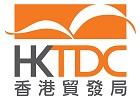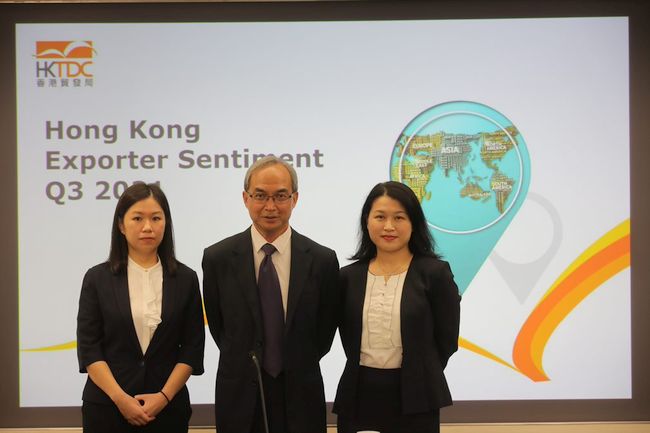HKTDC Export Index 3Q21: COVID, transportation costs dim Christmas sales outlook
- Written by ACN Newswire - Press Releases


|
| HKTDC Economist Samantha Yim, Director of Research Nicholas Kwan and Assistant Principal Economist (Greater China) Alice Tsang announced the HKTDC Export Index for the third quarter of 2021 at a press conference today [L-R] |
"The key issues seen as affecting Hong Kong's export performance in the coming six months continued to be the pandemic [45.5%, up 4 percentage points on the second quarter (Q2)] and softening global demand [20.3%, up 3.6 percentage points]," Mr Kwan said at a press conference today.
Digital transformation accelerates
In the survey, the proportion of Hong Kong exporters who reported having been affected by the pandemic (66.6%) rose 9.7 percentage points from Q2. The most-cited pandemic-induced problems include reduced order sizes (59.5%) and order cancellations (28.1%), as well as disruptions to logistics and distribution (58.6%) and increased transportation costs (53.6%). "It is worth noting that an increased proportion of Hong Kong companies reported difficulties in sourcing raw materials, parts and components. This category accounted for 24.6% of respondents, up 10.8 percentage points from the last quarter. This suggests that the supply chain may have been affected," Mr Kwan said.
Nevertheless, some Hong Kong firms (9.3%) said the pandemic had positively affected their business, which had benefited from increased product demand, especially in the electronics and toys industries. This is partly attributable to the COVID-19-inspired acceleration of digital transformation among enterprises, a restructuring of the global supply chain and a shift towards e-commerce, which together saw businesses invest heavily in electronics products to upgrade their operational resources.
"Under the pandemic, quite a number of Hong Kong companies have accelerated their digital transformation," said Mr Kwan. "The survey found that their digital business strategies include developing an online sales operation [56.3%], promoting products via a digital channel [56.0%], enhancing their cybersecurity [50.2%], developing a cloud computing/online management system [47.7%] and adopting digital payment solutions [31.9%]."
To address current market challenges, many Hong Kong firms said they were considering or would consider adopting various business strategies, including developing Mainland China sales (47.9%), building online sales channels (45.8%) and expanding their product portfolios (44.9%). Meanwhile, an increased proportion of Hong Kong enterprises were planning to diversify into new overseas markets (35.5%, up 7.1 percentage points), mainly in Europe (29.5%) and the Association of Southeast Asian Nations (ASEAN) region (20.5%).
Relatively stronger performers: toys and Japan
The HKTDC conducts the Export Index survey every quarter, interviewing 500 local exporters from six major industries including machinery, electronics, jewellery, watches and clocks, toys and clothing, to gauge business confidence in near-term export prospects. The index indicates an optimistic or pessimistic outlook, with 50 as the dividing line.
"Among industry sectors, toys recorded the highest reading and a relatively mild drop [44.0, down 1.1 points], while Hong Kong exporters were the least optimistic about clothing [36.1, down 7.2 points]," HKTDC Economist Samantha Yim said. "As for markets, exporters showed the most confidence in Japan [47.9] and Mainland China [47.8]."
The survey also registered declines in the Trade Value Index (54.1, down 2.9 points) and the Procurement Index (36.2, down 9.3 points). The Employment Index, on the other hand, rose by 3.1 points to 44.7, showing the labour market was relatively stable.
Bright spot: smart healthcare
HKTDC Assistant Principal Economist (Greater China) Alice Tsang said the pandemic, despite its negative impact on the global economy, has accelerated the development of smart healthcare, creating new business opportunities. "Under the pandemic, smart healthcare equipment has been gaining traction and consumers are becoming increasingly receptive to such technologies as remote healthcare, the medical-related Internet of Things [IoT] and health data management," she said.
"Automated and electronic healthcare services such as smart hospitals and remote medical consultations can ease human resources pressure and help meet the enormous healthcare demand from the world's ageing population. Hong Kong's elderly population, for example, is expected to increase to one-third of the total population by 2039," she added.
Ms Tsang noted many medical products and services have incorporated new technologies in recent years, such as wearable devices that measure and monitor health data, systems using big data and artificial intelligence to predict the chance of developing an illness, devices equipped with virtual reality technology for making initial diagnoses, robots that assist in surgery and rehabilitation treatment, as well as solutions for storing medical data in the cloud.
To reduce production costs, many of Hong Kong's medical and healthcare equipment manufacturers have moved their production bases to the mainland. However, quality control, marketing, R&D, design and material and equipment procurement continue to be carried out in Hong Kong. In the first half of this year, the city exported HK$7.8 billion (US$1 billion) worth of medical and health equipment to markets led by the mainland (24%), the European Union (18%), the United States (10%), India (8%), ASEAN (7%) and Japan (6%).
Ms Tsang explained that Hong Kong's medical and healthcare sectors are presented with new opportunities because of the close ties between the local and mainland healthcare markets, coupled with the city's role as a research and development (R&D) hub for the industry and a major fundraising centre for biotechnology companies. "Hong Kong possesses first-rate R&D talent, a strategic location close to production centres in the Guangdong-Hong Kong-Macao Greater Bay Area, a robust intellectual property protection regime and extensive international business networks. All these together make Hong Kong the ideal platform for developing smart healthcare," Ms Tsang said.
Highlighting Hong Kong's role as a regional healthcare investment platform, the Hong Kong Special Administrative Region Government and the HKTDC will hold the inaugural Asia Summit on Global Health on 24 November. Themed "Shaping a Resilient and Sustainable Future", the hybrid online-offline event will examine business and cooperation opportunities in Asia's healthcare sector. The event will include exhibitions, project presentations and Deal Flow Matchmaking sessions to facilitate business discussions and investment partnerships.
References- HKTDC Research website: http://research.hktdc.com/- HKTDC Export Index 3Q21: Threat of Covid-19 Variants Triggers Decline in Exporter Confidence Over the Near Term: https://bit.ly/3k5GEde- Smart Healthcare series https://bit.ly/3z6bB52- Photo download: https://bit.ly/3hxh6E1
Media enquiries:HKTDC's Communication and Public Affairs DepartmentBeatrice Lam, Tel: +852 2584 4049, Email: beatrice.hy.lam@hktdc.org
About HKTDC
The Hong Kong Trade Development Council (HKTDC) is a statutory body established in 1966 to promote, assist and develop Hong Kong's trade. With 50 offices globally, including 13 in Mainland China, the HKTDC promotes Hong Kong as a two-way global investment and business hub. The HKTDC organises international exhibitions, conferences and business missions to create business opportunities for companies, particularly small and medium-sized enterprises (SMEs), in the mainland and international markets. The HKTDC also provides up-to-date market insights and product information via research reports and digital news channels. For more information, please visit: www.hktdc.com/aboutus. Follow us on Twitter @hktdc and LinkedIn
Copyright 2021 ACN Newswire. All rights reserved. www.acnnewswire.com
Authors: ACN Newswire - Press Releases
Read more //?#

